The grass is a cultural being. So are cat tails and so is poetry.
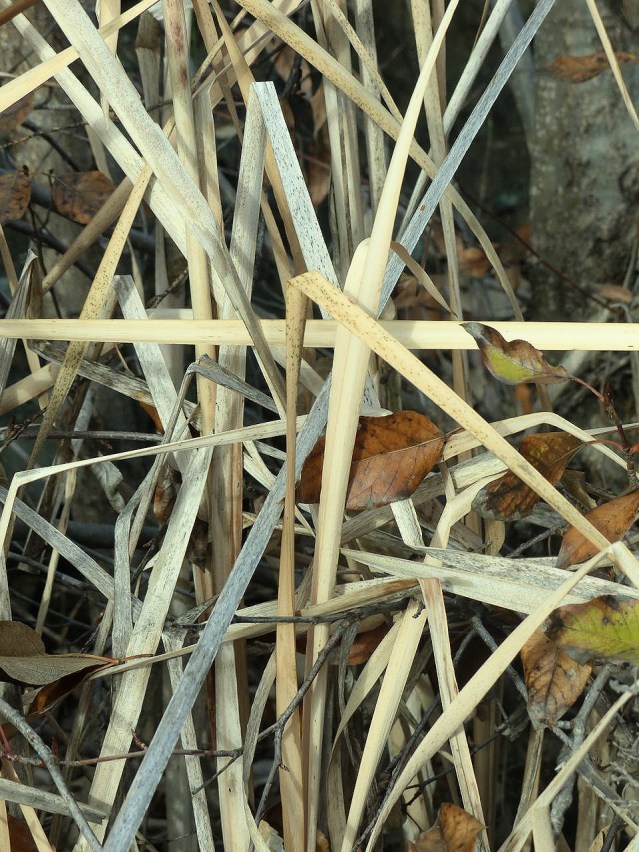
Talk about a rhyme scheme, eh!
First, the grass. Not only does it have its own culture, but it is part of the body of human culture in these valleys, canyons and plateaus between the mountains, on the west of North America.
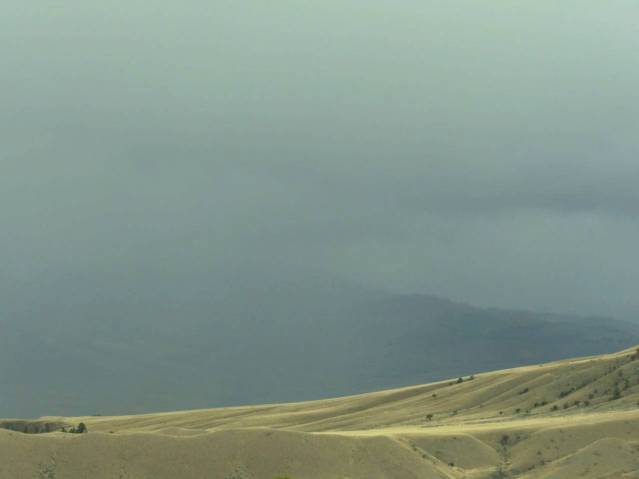
Yellowstone, North Gate.
You are not looking at dead grass here. You are looking at water catchers, upside down umbrellas, which the grass has made to draw water from the air. You are looking at upside down wells.
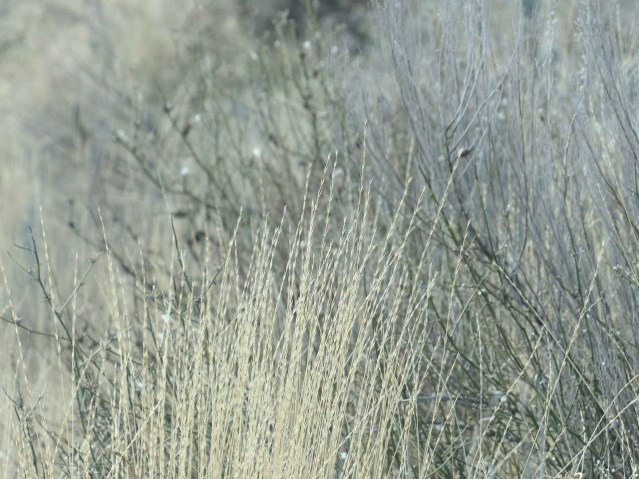
To keep them from matting on the ground and reducing the land’s productivity, fire burns them away, so they can be renewed. Traditionally, people have set those fires. It was the first stage in the primary, human civilizing impulse: cooking. First you make the land productive with fire (you make it into an art form), then you harvest it.

Bella Vista
Here’s a different way of being grass, one not native to this place, and one not harvested. It is, accordingly, not an art form, but is wild:

This is cheatgrass. It bursts like flame out of the soil in October, grows all winter under the snow (yes, under the snow) and has replaced hundreds of indigenous species in the tapestry that is the body of this place. Look how it collects water. It urges it to flow off into the soil, where old thatch holds it from evaporating, and then it uses it all up, denying its use to all other plants. It loves monocultures. That is not the bunchgrass way. The image below shows what happens when fire is suppressed in this landscape…

Kalamalka Lake Provincial Park
Do you see that bunchgrass there, at the end of 8,000 years of history, encroached by soap berries and escaped farmyard grass? It will soon drown. Below is an image of what happens when trees are not controlled by fire. The ponderosa pine below has showered the land with fire, or needles, if you will. They burn the alkaline soil down to acid. Look at the bunchgrass drown.
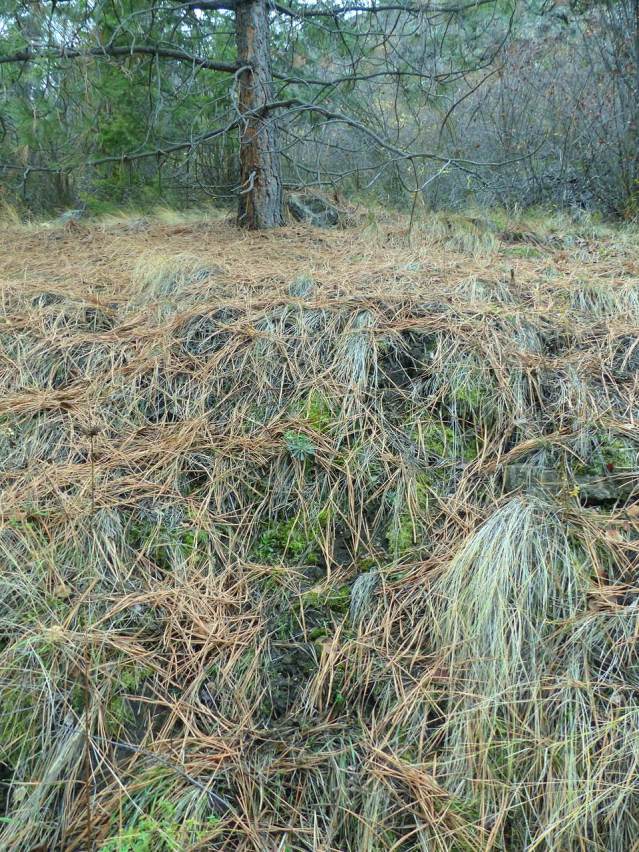
Rattlesnake Mountain
This is happening on our watch, in our time, in our parks, in what contemporary culture calls nature and “wilderness,” while attention is directed towards smokestack emissions and pools of plastic in the middle of the sea. We don’t have to go that far. Nature itself is the culprit.

Turtle Mountain
Let’s be clear about this nature. All of the parks of the west were created out of former indigenous cultural space. That’s to say: around 150 years ago, there was no nature here; only social space. Then it became “wild,” when dispossessed of its people and left fallow. It became a different art form: one that created emptiness where there had been fullness, and a mechanical earth where there had been a living one.

Royal Gala Industrial Apple Plantation, Bella Vista
This process started in Washington in 1892, when all federal lands purchased for tiny sums during rushed treaty-making processes and not by then already dedicated to Nez Perce or Spokane or Skoielpi use (among many others), were rededicated as national forests. Land that had formerly been maintained by fire, now was expensively protected from fire, to preserve its “pristine” nature.This “pristine” nature is, in other words, a culturally-created thing.
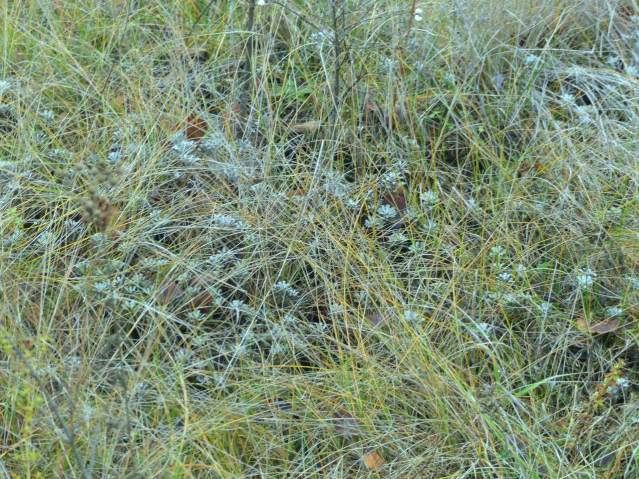
The culturally-charged process of plant succession.
Rattlesnake Mountain
This process moved to British Columbia in 1922. The fire still burns. It costs hundreds of millions of dollars to combat every year, to no avail. That’s the fire we can see. This, below, is also that fire, though:
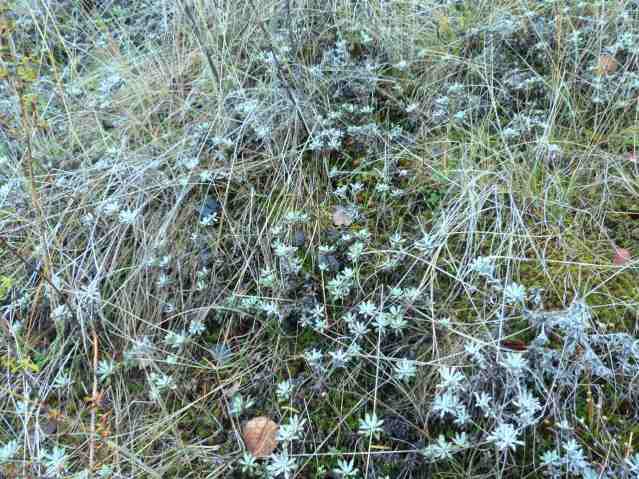
It is burning within Syilx space. The grass that has almost been replaced here by “nature” is still a cultural being, but it’s now viewed with terms appropriate to “nature,” which are not the terms appropriate for viewing culture: beauty, for instance, wildness, for another, health, for yet another, inanimate, for another, plowable, for another, and developable, for another. And that brings me back to poetry. Here is some Cascadian poetry (Please click on the link to view. It will open in a new window.)
Very Serious and Full of Vegetables
That is a cultural product produced in this place, one which heartfully honours a tradition, but it is, as you will have noted if you clicked on it, a poem about people and human attitudes towards all kinds of things, but includes no attitudes of grass or fire or rain to anything. It’s not about that, likely on the anti-romantic presumption (accurate enough) that no-one can speak for these things. In their place, I think the poem is about taking wild human energy (a created art form) and distilling it down to points of social utility, and through a process of manipulating that social machinery enabling people who live within it to ultimately come to a physical experience of grass through the only route the tradition allows: through the mind; not the body. The body plays the role of memory. This has been the American poetic project for over a century now. Here’s an early draft of it, from the American poet Hilda Doolittle, written a century ago:
Hermes, Hermes,
the great sea foamed,
gnashed its teeth about me,
but you have waited,
where sea-grass tangles with
shore grass.
Hilda Doolittle, from Hermes of the Ways
It’s beautiful, and lands solidly on grass and brings it to life in the mind, but it is a thing of the mind trying to escape itself by means of the earth. It can’t shake that. It is, in other words, bookish. Often Hilda tried the trick she uses in the following poem:
O white pear,
your flower-tufts
thick on the branch
bring summer and ripe fruits
in their purple hearts.
Hilda Doolittle, from Pear Tree
In this one, she uses the same memory trick but also speaks to the tree, yet her identification is incomplete; it is an artifice only; she is not the tree, nor is she its flowers. Her poem is a construction of words and energy contained with words — a thing of memory, in other words, a funereal ode. Her identity is untouched by it, and is not transformed by it. It is infused with it, for sure, and, no doubt strengthened, but, still, untouched. And the poem is very beautiful, too. It is not of this place, of course, nor did Hilda mean it to be. I use her words only as an example of how poetry and land can remain separate, even in intimate moments, and how American identity engineering often places the land within fences, called words — farms, cities or streets, if you will — and observes them from there. That is a very anglo saxon thing, of course, but for me, as a man of the grass, this is a step away from the earth not one towards it, because for me the grass is not just a part of a social group, but also of a self. To say “O white pear” just won’t do. It would be like saying, “Oh me.” And then there’s Paul Nelson’s riff on Whalen, with his
“having the curious ability to make one think
that a mind has been slowed down.”
Very Serious and Full of Vegetables
That’s beautiful, too, but it is predicated on the conceit that mind has been sped up in the first place, with a secondary conceit that any subsequent slowing down is only illusory. I dispute that. I think it needs to be strongly challenged. According to settler ideology, the grass is wild, and is the canvas for paintings of human will. In other words, it is this:

A weed-filled bunchgrass slope, a choke cherry tree, and a ponderosa pine, set in front of a monoculture hay field. Coldstream, British Columbia
No-one would want the social identity of that hay, because it is enslaved to individual and social human will. What’s more, to enslave it is to enslave (or fence) human selves, including those of the wielder of will. It’s not about a mind slowing down or not slowing down. It’s about whether that image above shows wilderness or cultural space. It’s about who you belong to: the grass, or other men. Unifying those opposites is not as easy as creating a national forest and building new parks within it for poets to walk through and find beauty.

Fire Pine, Yellowstone
They can. That work has been done. Now it is time for the land to speak. Now it is time for people who are the land to speak — not as a conversation within American or Canadian or Western poetry, and not as an address to or for that fire pine. It means, among many other things, making this tree the centre of the world — not as a symbol of anything. This tree, right here, right now. That kind of thing. Rilke found it a century ago. We are that far behind here. To find that tree probably means finding new words. That is good, honest work. It absolutely means finding new forms. That is powerful work for people engaged in finding poetry in the world and working with it. It means being present, not in memory but in the unfolding that is memory’s form in the present.
 Yellowstone North Gate
Yellowstone North Gate
That is why I have stepped aside from traditions of Cascadian poetry, although few people in this land know it so intimately or have been the channel for poetry within it for so long. I just can’t do metaphor anymore, that’s the thing. I can’t do nature, and if I’m to be bound by a line of will, I want it to come from that pine, not traditions of politics and the poetry of identity politics from a foreign country and foreign traditions. That is or the citizens of those fields. For me, in this grass, joy will do just fine. This is partly what I meant in my new book The Art of Haying: it’s possible to live well as the earth; the ego is just the book talking as it keeps us in line. It’s possible to walk out into the grass. Here’s an article on The Art of Haying in BC Book Look. 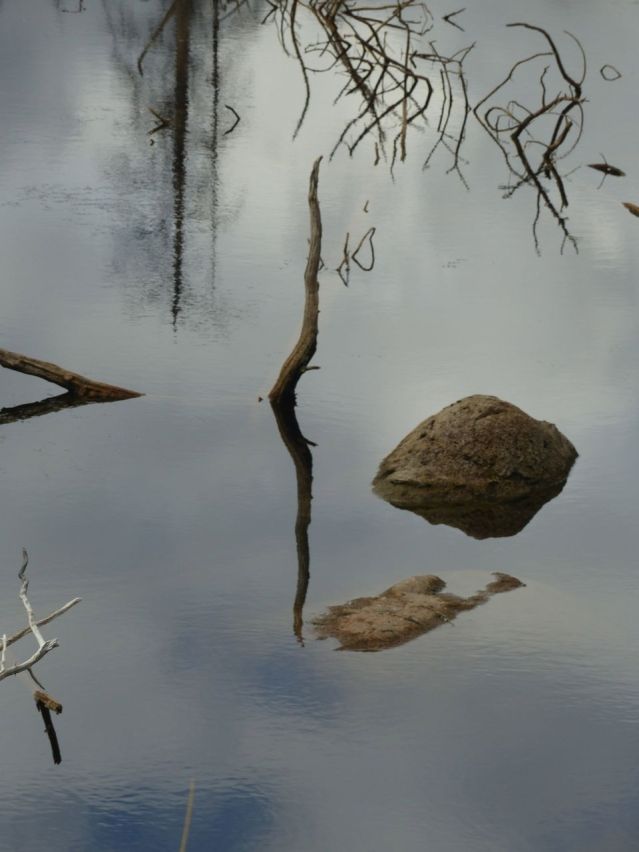
Big Bar Wet Land
Blessed be.
Categories: Endangered species, Erosion, Ethics, fire, fire gardening, First Peoples, Forestry, Global Warming, Grasslands, History, invasive species, Recreation, Science, Water

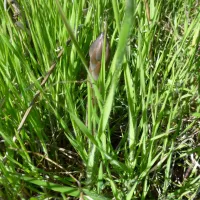

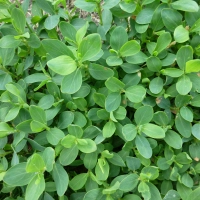
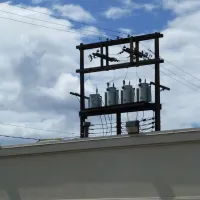








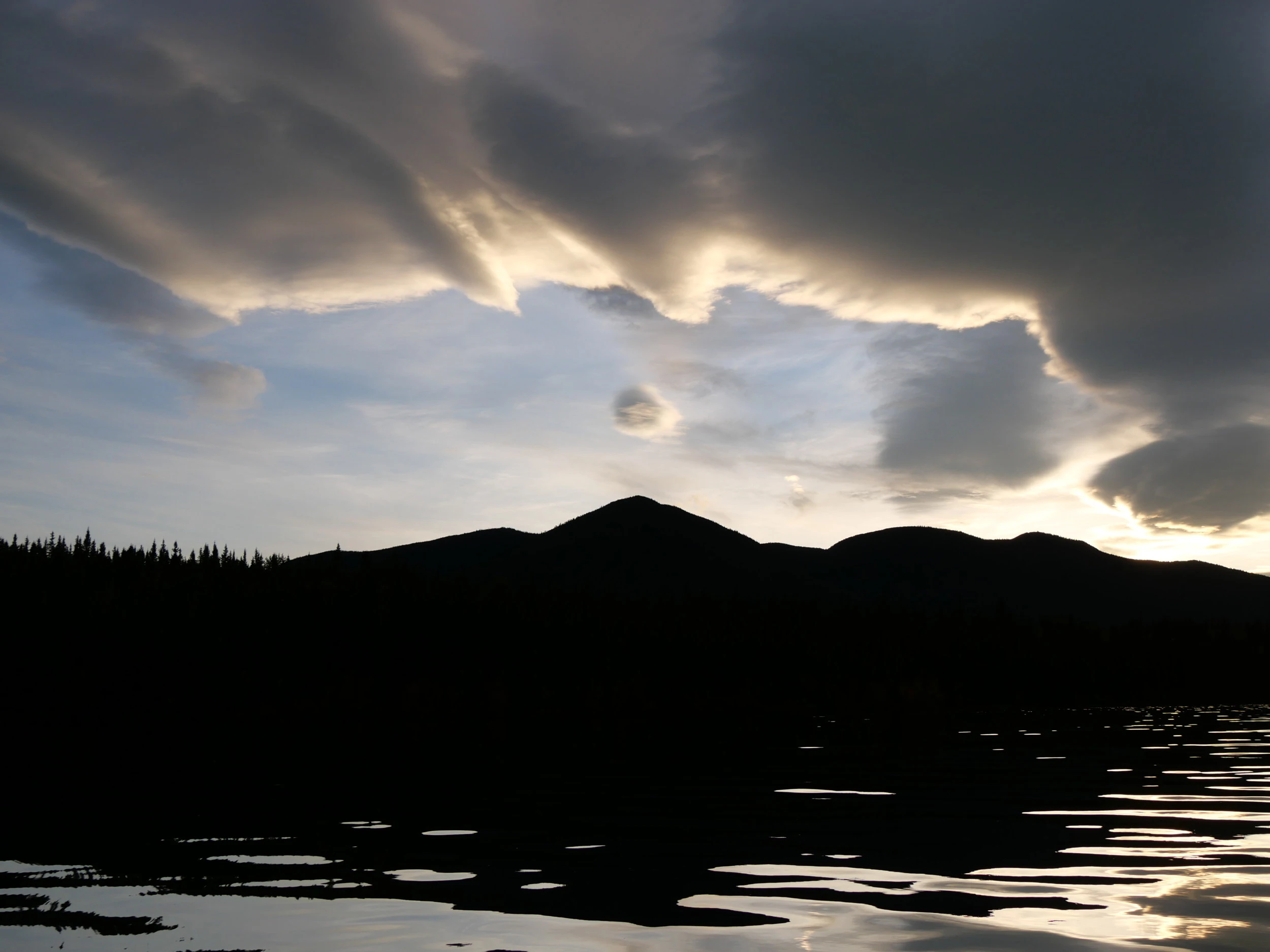
I loved seeing the piece on The Art of Haying today. And anything which celebrates grass….
LikeLike
The grass is great stuff, for sure! The light in the grass is great these days, so low and orange at dusk!
LikeLike
Harold! Thanks for linking to my poem. And thanks for the suggestion that what I do is CASCADIAN poetry, but I am not able to take credit. There are many strains here and mine is just one thread. There may be thousands. And the poem you cite requires a little background. The quote you plucked out for “opposition” is a Lew Welch description of Philip Whalen’s poetry. (Welch and Whalen, two Cascadians who knew a thing or two about place.) One was a Buddhist monk for whom my poem is an homage. (Whalen, whose tradition would know a thing or two about “monkey mind.”) And my poem is written from the stance (as Jonathan Skinner so eloquently points out) that sees nature as not OUT THERE, but something that is embodied. A great quote from his paper given in Brussels at EBSN4 is:
“Most relevant to [Michael] McClure’s gestural poetics is system theory’s break with the representational model. McClure proposes an “organic” poetry, but one in tune with emerging life sciences (focused at the time on cellular biology) that in their embrace of radical contingency dispense with the continuity and physical unity implied by “form” as “extension of content.” Rather, biologist Ramon Margalef’s “cybernetic” focus on boundaries between systems, boundaries that can be arbitrarily drawn, “frees us from the need to define ecosystems that are more or less closed.” For McClure, ecopoetics does not begin with an idealized picture of “nature” but with affective work at the boundary the poem itself declares.”
As George Bowering has noted time and time again, the folks in BC in the early 60s who were taking a page out of the Black Mountain stance-toward-poem-making were encouraged by Charles Olson to dig into the place in which they lived. Surely Fred Wah knows a thing or two about nature, no? And the folks who opposed TISH most vociferously back in the day were those formalists who preferred a colonized verse, that which took its cue from England and later the new formalists, such as Robin Skelton, your teacher. A very conservative stance-toward-poem-making, but Indigenous? Hardly. He was not prepared for what came after, it seems to me.
So, I am not sure what your stance opposes, nor am I sure opposition is a worthwhile pursuit. As also pointed out in the post from which you cherry-picked the quote and poem is:
“Conventional thought, mental provincialism, a subconscious narrowing of scope – these attach themselves to an artist’s capacity like barnacles to a ship. Staying open or spacious requires real work and guarantees little. Viewed from outside, a person attempting this might be called politely, “loosely strung.” Less politely, but more literally, a person trying to crack out of closing intellectual shells could be described as ‘crazed.’”
Oh and if you read Projective Verse (http://paulenelson.com/organic-poetry/projective-verse/) you’d find that Olson was not big on metaphor, nor simile, but felt they were a drain on the energy of the poem:
“And the threshing floor for the dance? Is it anything but the LINE? And when the line has, is, a deadness, is it not a heart which has gone lazy, is it not, suddenly, slow things, similes, say, adjectives, or such, that we are bored by? For there is a whole flock of rhetorical devices which have now to be brought under a new bead, now that we sight with the line. Simile is only one bird who comes down, too easily. The descriptive functions generally have to be watched, every second, in projective verse, because of their easiness, and thus their drain on the energy which composition by field allows into a poem. Any slackness takes off attention, that crucial thing, from the job in hand, from the push of the line under hand at the moment, under the reader’s eye, in his moment. Observation of any kind is, like argument in prose, properly previous to the act of the poem, and, if allowed in, must be so juxtaposed, apposed, set in, that it does not, for an instant, sap the going energy of the content toward its form.”
For a guy who complains about things being a construct of the mind, yours seems to have gone off in some wild directions with equally wild and quite debatable assumptions. I think you’d benefit from being part of a conversation. Nature begins with us and our perceptions, our proprioception. The land is not separate, in the lineage from where I find inspiration. The moment is key, as there is nothing else, but tickled that you continue to respond to my work, even if your assumptions are unique and wildly off the mark.
LikeLike
Paul, thanks for writing! I was going to send this to you tomorrow. Be relieved, though. I’m giving you the Cascadian poetry thing, which is, actually, a way of saying I don’t believe it has any real hope of success, as a bioregional artefact, although the energy you pour into it, and your poetry, are inspiring. I believe it has every chance of success as a social artefact, however, created by people interacting with the bioregion through certain emotional and intellectual channels which are quite culturally specific. At least, that’s what I tried to show in my post. What work coming out of it will likely be exciting … especially to someone who shares your culture (as you inhabit it) and its assumptions and ways of being and traditions. Your project, and the examples you give above, are all profoundly U.S. American, or U.S. Canadian, and I’m not. I love Pound and Williams for their ability to shake up notions of identity and for their ability to integrate European and American modes and ask the important (still unresolved) questions. Skelton, however, is actually indigenous, just Irish Sea and North Atlantic indigenous, but we’re all using his language here, so he has every right to be, as least as much as anyone else. What’s more, he was a neo-formalist, sure, but so was Snodgrass and so was Lowell and so was Berryman and so was Hugo and so was Wagoner and so on, and, besides, Skelton did perhaps more than they did towards finding a form that bridged the variable foot (or other American inventions) with indigenous English, Irish and Welsh traditions, and one that is still highly relevant in Canada. Beware of calling me Canadian, though. We are multiple. There is no such thing as “Canadian.” It is a united nations not a nation state. Beware as well of defining Canadian links to English tradition (as opposed to American links to English tradition) as somehow more or less colonial than the U.S. versions. They’re just different, as they should be. Truth is, though, I have deep roots in German culture as well, as I should have, but I’m a poet of this place more than anything else. To accept your boundaries of thought and identity, however, as well as your prescriptive notions of populism and democracy would be to place myself in a colonized position, which I’m just not going to do in my own grassland. Even the Yakama are trying to fight that. There’s lots to love about America, but U.S. notions of identity, and the poetics that help to create and sustain them, are for you guys. The rest of us can read them as anthropology, learn lessons from them, and apply them in our own ways to our own circumstances, or not, as we choose. The Cascadia poetry committee choses to. I chose not to, partly because of my roots in marxist and phenomenological thought, but also because of my roots in the north european culture that remains the forgotten half of the world literary equation a century ago, rather than the structuralism you prefer. Reclaiming that tradition, lost because of war, appears to me to be more important than adopting one from a foreign country today, one which has no linkages to the work I read or which inspires me. I used to love all that stuff, don’t get me wrong, but then I went to East Germany. It’s a long story. I won’t bore you. Like you, however, I believe that changing the parameters changes the situation. For me, however, it is identity that is to be changed — along just the very lines you wish me to engage with you on. I don’t see a lot of debate possible along those lines, though, given the power structure of the Cascadia poetry festival project. For me, avenues in Cascadian culture worth following all lead towards working with the land, but that should be no surprise; I am imprinted with it, just as you are imprinted by the urban environments in which you thrive, and which I, being land-based, view as being outposts of the countries they serve and not this land itself. Why would it be otherwise? Note, I don’t call it Cascadia much anymore. I leave that to you. I’ve done my time in Open Books, that lovely poetry-only bookstore in Seattle, but have rarely bought anything there. It’s just work to plow through that stuff, and I’m not hired as an academic to study it anthropologically, nor am I an anthropologist, so I leave that to the critics. There are many of those, people who enjoy living in that strata of thought and maintaining the tradition from that viewpoint. The relationships are complex, of course, and no-one, including you and I, is one thing, but I think there’s also enough to follow, in Columbian religion, Old Norse, Chinook Wawa, s’lahal, phenomenology, Goethean science, Gaia theory, geology, Rilke, Celan, Pound, syilx culture, Williams, Thoreau, post-Marxism, particle theory and such like for many lifetimes, without having to set all that aside in order to argue the fine points of one particular strand of American culture with Americans, who inhabit what for me would be a passive colonial appropriation of an immigrant identity — in my own grasslands. It’s a weird thing about culture here north of the 49th that most culture comes from the south and replaces the culture here, and transforms active creative processes into passive ones. Actually, it’s a global thing now, and I remain a rather rare bird: a global poet writing from a small space. But that’s the culture in this place. It might be colonial, but that’s just a word. If there are 1,000,000 poets celebrating unified global culture, which to me is a form of American culture, one talking about this grassland between the mountains on the Northeast Pacific Shore is probably a good thing, as odd as it might appear, and, with all respect, not wildly off the mark — only un-American, which should be a celebration. That being said, few poets from this place have travelled as enthusiastically or as often or as far or as deeply within the American Pacific Northwest as I have. In terms of staying open, I’ve gone out to the world and changed my self completely. I only know a couple other poets who have done so. If I have difficulties explaining what I found, that’s no reason for setting it aside to adopt what you have found. If I felt that we could work together on a mutually-supportive basis on the Cascadia Poetry Festival, I would. The power balances being what they are, however, and your insistence on telling me the correct ways in which to think, and the parameters of identity within the poetry you champion, don’t make it seem very likely. I do feel, however, that dialogue with you is fruitful, and I hope we will have many discussions. Olson’s thought is of its time and place. If you are of that time and place, that’s great. Great things should follow. I’m not. I’d rather read poetry that excited me, as I’m sure would you. To me, most of the poetry of Cascadia is poetry written from a series of social stances which I don’t share. To write like that would be to celebrate the lives of others but not my own. That’s not healthy. For that reason, I leave the poetry of Cascadia to you, which I see as a story of its major cities, and will work on a story of the land instead. It is easy to say how to resist Nazism or oppression. That is a well-known narrative. Other forms of resistance are necessary, too, but are unscripted. Part of the work of crafting a vision is to create a space in which that creation is possible. For me, that space rises from the land.
LikeLike
Harold!
Someone in Italy in 2005 said to me, “You don’t seem like an American.” I said, “Thank you.”
I do not tell you how to think, nor do I believe the “Cascadia Po Fest power structure” you ascribe to me or my doing is anything but a construct of your own making. But then I do think that characterization is based on your need to be “in opposition” and “resistance” words you use regularly. I prefer to take the stance of embracing things, not opposing them. Or at worst, using negative prehension as my friend Pattabi would say in the vein of Whitehead.
For instance, poets you cite: Snodgrass, Lowell, Berryman, Hugo and Wagoner (all men by the way) are of the closed tradition, though Hugo probably stands out in that group, though he studied with Roethke who made the transition to open form very late in his life and late in the game. I do not oppose their verse, but prefer work that has more energy.
And Olson may be a product of his time, but so is Hua-yen Buddhism and the Runes and Thelonious Monk, Miles Davis, Claude Monet’s Rouen Cathedral series, Jasper John’s numbers, Clyfford Still’s painting, Joanne Kyger, Brenda Hillman and Nate Mackey’s poetry and Gertrude Stein’s work, and yet we see how all this continues to shine, so I am guessing that Olson in his poems and poetics was able to connect with a dimension “larger than the self.” How to do that? Go larger than opposing something. There is humility in that place, a key ingredient.
Wish the funders saw my project with as much “power” as you do and wish I could show you the High Divide of Olympic National Park. You’d see me a little more closely than someone who can be written off as an “urban” poet. But we are destined to disagree in many ways, most notably in your need to “oppose” that which you disagree with. I see things, like the poetry you mention, as less energetic and closed, but also see the results of that cosmology. In fact it has much to do with the world situation at this time, just that the poets are less violent. In the case of poets, I do not need to oppose, but I’ll be there when their stance runs out of gas and will make myself of use to them.
But carry on. I seem to be inspiring something in you. To be of use is an honor.
LikeLike